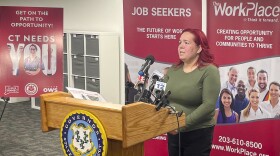The weekly $600 in additional federal unemployment benefits -- a payment more than 20% of Connecticut’s workforce has been relying on -- disappeared as of July 25. Treasury Secretary Steven Mnuchin last week announced a plan to replace it with a lower payment -- Republicans contend that the $600 per week discourages work.
We depend on your support. Donate to Connecticut Public today.
Brita DeMars was already looking for additional income before the pandemic started. Then her work as a self-employed jewelry maker dried up.
She was relieved when she heard self-employed folks like herself could get unemployment benefits, but she was rejected. Over a week later she got a letter.
“I was eligible for about $13 in unemployment benefits per week for 26 weeks,” said DeMars.
A two-week stint at a temp agency in late 2019 threw off her earnings. But then the extra $600-per-week federal benefit came through. Now that’s all the income she’s got.
She’s the sole earner for her family. Her husband collects Social Security and her 17-year-old daughter hopes to go to college in the near future. DeMars says they have one used car for their family and credit card bills to pay.
“So it’s like, I wasn’t getting ahead before and if it weren’t for this additional unemployment check, I’m basically breaking even right now,” she said. “I may be doing a little bit better than I was before, but I’m by no means inspired to stop looking for work.”

As of now, it appears the benefit will continue in some form. Sen. Richard Blumenthal said recently that very few of his colleagues want to cut the additional benefit completely. The debate is on how much it should be.
“The $600 represents a commitment to keep people as near as possible to what they were making before,” Blumenthal said at a news conference.
But some in government are concerned that the $600 payment is making it hard for people to justify taking lower-wage jobs. A University of Chicago study found that 68% of eligible workers nationally took in more money from the benefit than they would have made in wages.
Steve Schwartz from Express Employment Professionals has been doing that math. It’s something he was contemplating at a drive-thru job fair he hosted last week.
The way he calculates it, for people making $12 an hour, their annualized income would be about $25,000. Between regular unemployment benefits and the $600 a week, “your annualized income with the $600 is $47,000 a year, said Schwartz, sharing the calculation on his phone.
“I don’t blame anybody for not working and taking that,” he said. “I don’t blame anyone for not working and taking that because it’s a great benefit. And you owe it to yourself and you owe it to your family to do the best for them.”
And that’s exactly what Schwartz and his wife, Christine, have seen in their work recruiting for local employers. Their phones have been pretty quiet, Christine said, because of the additional $600 a week, but in the last few weeks, “there’s definitely an uptick. People are starting to maybe get anxious, about like ‘well, I gotta figure out what I’m gonna do now.’”
And the idea that there aren’t jobs is just not true, according to Schwartz. Niche markets are hiring, including online order fulfillment, food manufacturers, truck drivers, even gun and camping gear manufacturers.
The couple say they regularly tell companies that offering a lower wage might not attract employees in part due to the benefit, and in part because those same workers could find similar jobs with better pay elsewhere.
Add to that the uncertainty of child care and the possibility that schools may not go back in person this fall -- and the calculation for many workers is close to impossible.
The extra unemployment benefit may have had an end date, but as Brita DeMars reminds, coronavirus works on a different schedule. “This is not ending, it’s continuing and we don’t know when it’s gonna end,” she said.
Ali Oshinskie is a corps member with Report for America, a national service program that places journalists into local newsrooms.





